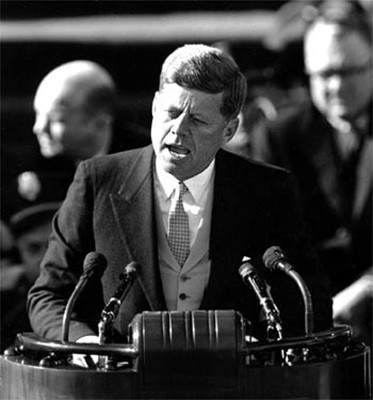Books and arts
文藝
John Kennedy's final days
肯尼迪最后的日子
When America wept
整個美國為之哭泣
JFK's Last Hundred Days: The Transformation of a Man and the Emergence of a Great President.
肯尼迪的最后百天:一個男人的轉變,一位偉大總統的誕生
FOR Americans of a certain age, memories of November 22nd 1963 remain painful.
對于那個年代的美國人來說,1963年11月22日的記憶是沉痛的。
Their dashing young president, John Fitzgerald Kennedy, was assassinated in Dallas.
他們年輕而又風度翩翩的總統,約翰杰茨弗拉德?肯尼迪在達拉斯市遭到暗殺。
Shock and mourning ensued.
這個消息讓人為之一震,人們紛紛悲慟哀悼。

The loss may have been all the harder because Kennedy had been growing steadily on the job.
肯尼迪在工作上的表現蒸蒸日上,因此他的逝去讓人們感到惋惜。
His first year in office was marked by the ignominious Bay of Pigs, his failed effort to eject Fidel Castro from Cuba.
他執政的第一年因“豬灣事件”將菲德爾?卡斯特羅驅逐出古巴的失敗嘗試而蒙羞。
A year and a half later, the Cuban missile crisis brought America and the Soviet Union to the terrifying brink of nuclear war.
一年半之后,古巴導彈危機將美國和蘇聯推向核戰爭的邊緣。
But by the autumn of 1963, Thurston Clarke argues in this study of the president's final days, Kennedy had begun to “realise his potential as a man and a president".
瑟斯頓克拉克在他《肯尼迪最后的時光》這本書里談論道,1963年的秋天,肯尼迪已經開始“意識到他作為一個男人和一位總統的責任”。
His confidence was rising.
他的自信心倍增。
Having narrowly avoided nuclear war, he was determined to have peace.
微妙地避開了核戰爭的爆發,他希望和平。
Finding like-mindedness in Nikita Khrushchev, the Soviet leader, he secured a treaty that banned nuclear tests in the atmosphere, in space and underwater.
在這一點上他和蘇聯領導人尼基塔?赫魯曉夫的觀點并無二致。他確立了一項“部分禁止核試驗條約”,條約中禁止在太空和水下進行核試驗。
It was, Kennedy told the nation, “a step away from war”.
肯尼迪向美國民眾宣稱,這個條約的簽署“離戰爭又遠了一步”。
Vietnam also dominated his final months.
在最后的幾個月里,越南也是他的心頭之憂。
Even while half-heartedly encouraging a coup that toppled and killed Ngo Dinh Diem, the South Vietnamese leader, Kennedy seemed determined to draw down the American presence and avoid a future quagmire there.
盡管他并無決心支持發動一場政變,顛覆南越政權并殺死領導人吳廷琰,但是肯尼迪似乎意在減少美國在越南投入的兵力,避免泥足深陷。
He spent time, too, on civil rights and the space race.
另外,他在公民權利和太空競賽方面也投入了精力。
He began planning his re-election and even laid the groundwork for secret talks with Mr Castro.
他開始籌劃連任,甚至為與卡斯特羅的密談做了準備工作。
His relationship with his glamorous wife, Jacqueline, also improved.
他同他漂亮迷人的妻子,杰奎琳的關系也有所改善。
In August 1963 their second son, Patrick, was born prematurely and died within days.
1963年8月他們的第二個兒子,帕特里克早產并在幾天后夭折。
After that, Mr Clarke shows, Kennedy was more solicitous towards his wife.
克拉克覺得從那以后,肯尼迪對妻子多了些關懷。
Evidently he cut back on his reckless womanising, though whether this would have lasted will never be known.
很明顯的是他沒有再流連于女色,雖然這個做法有沒有持久下去我們不得而知。
“I think we're going to make it.
“我覺得我們都在努力。
I think we're going to be a couple,” the first lady told a friend not long before the fateful trip to Dallas.
使我們逐漸回到原來那種親密的關系,”這是那次命運攸關的達拉斯之行前,第一夫人這樣對她朋友說道。
Kennedy's lifelong health problems also diminished.
困擾肯尼迪終生的健康問題也有所好轉。
Mr Clarke is a good storyteller, and his account—one of many JFK books timed for the 50th anniversary of the assassination—offers an enjoyable snapshot of the day-to-day workings of the presidency.
克拉克是一位優秀的作者,他的著作—眾多紀念肯尼迪遇刺50周年書籍中的一本——生動地介紹了總統的日常工作。
One moment sees Kennedy holding a meeting on poverty in Kentucky; the next finds him romping with his children, Caroline and John.
在某個時刻,肯尼迪在肯塔基州召開關于貧困問題的會議,下一幕你會發現他同女兒凱若琳,兒子小約翰在一起玩耍。
The format also affords passing glimpses into Kennedy's views on issues such as the space race and getting out of South-East Asia.
書中還有肯尼迪對諸如太空競賽此類問題的看法。并且逐漸撤出東南亞。
The book's core argument—that Kennedy came into his own during his final 100 days—is not entirely persuasive.
這本書的核心內容是—在他最后的100天里,肯尼迪活出了自我—這一點并不完全具有說服力。
His biggest triumph had come when he averted a nuclear war during the Cuban missile crisis.
他最大的功績是在處理古巴導彈危機時,避免了核戰爭的爆發。
The nuclear test-ban treaty was significant, and it gave hope to cold war-weary Americans.
“禁止核試驗條約”意義重大,它給冷戰時期厭戰的美國人帶來了希望。
But whether Kennedy could have sustained improvements to his marriage and his health, and got a strong civil-rights bill past Southern segregationists in Congress, is less clear-cut.
但肯尼迪的婚姻和健康狀況是否有了持久的改善,是否在國會通過了反對南方種族隔離的民權法案,就不得而知了。
Ultimately, finishing the job fell to a man Kennedy despised.
最后,重任落在了為肯尼迪所不齒的一個身上。
Vice-President Lyndon Johnson, a former majority leader of the Senate, was disparaged by the Kennedy White House as “Old Lyin' Down” and “Uncle Cornpone”.
副總統林登?約翰遜,曾經的參議院多數黨領袖,肯尼迪政府戲稱他為“Old Lyin' Down”,和“玉米餅大叔”。
But after Kennedy was shot, the ambitious and often ruthless Texan took the reins and pushed through a host of Kennedy initiatives, including an important bill that banned discrimination in schools and other public places.
但在肯尼迪遇刺后,這個胸懷大志,并且冷酷無情的德州人執掌大權,推動了肯尼迪定下的議程,包括一項在學校及其他公共場合反對種族歧視的法案,約翰遜還將美國勢力更加深入越南。
Johnson also led the nation further into Vietnam. Had Kennedy lived—had his last 100 days in office come in 1968-69, not 1963—things would have been different.
如果肯尼迪還活著,他在任的最后100天是在1968和1969年間,不是在1963年,事情將會變得大相徑庭。











